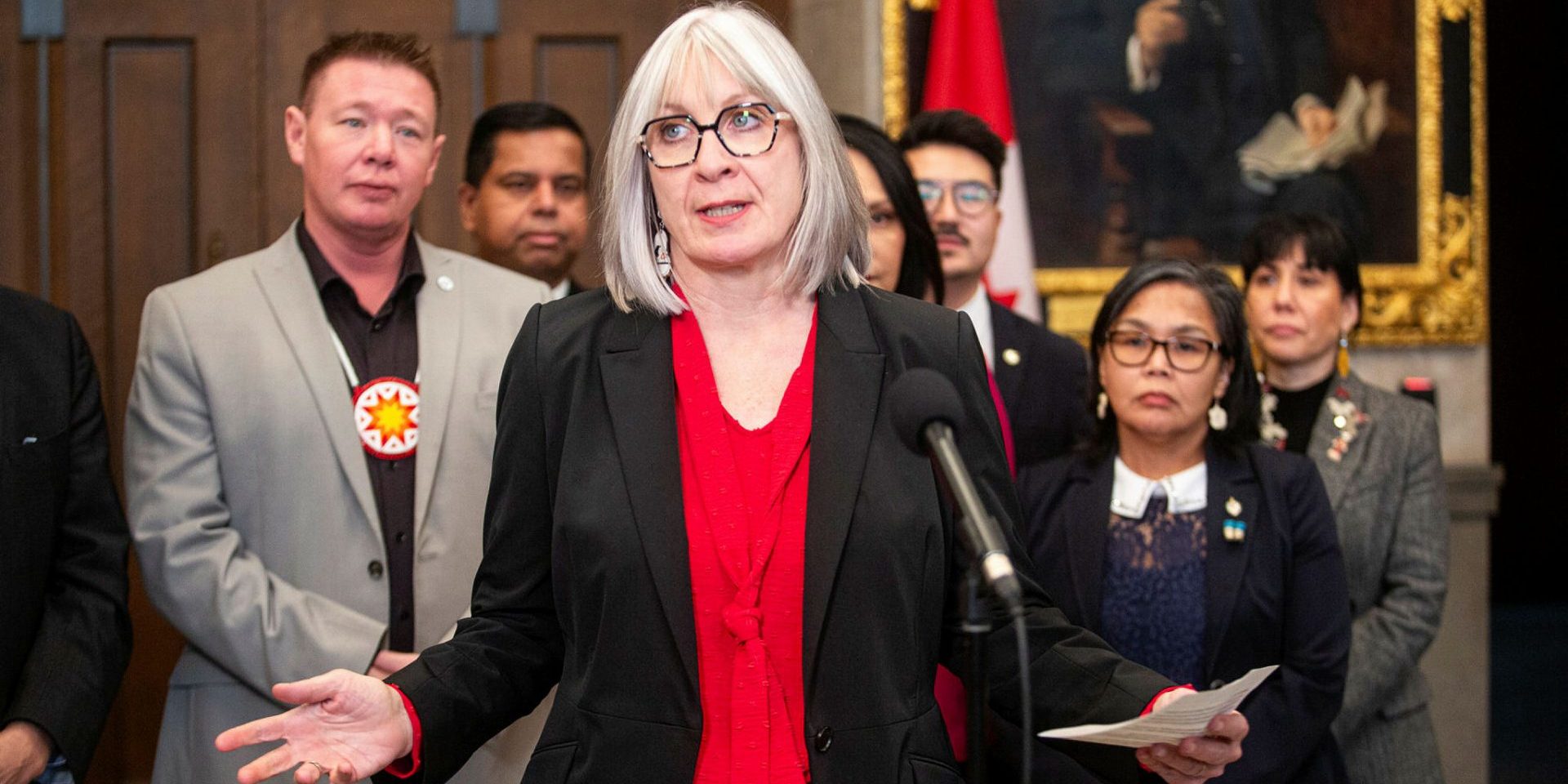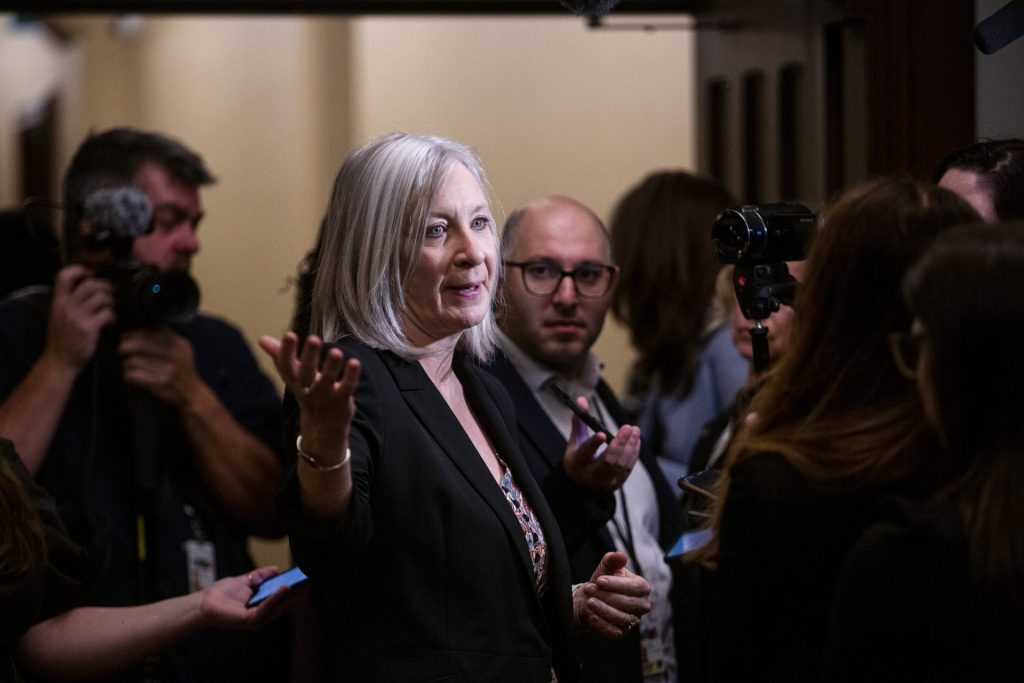‘We can’t waste any more time’: feds’ procurement plan failing at economic reconciliation, say Indigenous leaders and MPs

Indigenous leaders and opposition MPs say the federal government’s procurement strategy is failing to provide meaningful economic development for Indigenous communities, with their businesses securing only a fraction of federal contracts.
“We’re not seeing any economic development in Indigenous communities when non-Indigenous people benefit from the program,” Shannin Metatawabin, chief executive officer of the National Aboriginal Capital Corporations Association, told The Hill Times in an Oct. 29 interview.
Metatawabin said “if managed right,” the federal government’s controversial Procurement Strategy for Indigenous Business (PSIB) has “great potential” to provide Indigenous Peoples with opportunities for economic reconciliation, but it should be an Indigenous-led process.
He said procurement is an important step toward economic reconciliation, and suggested collaboration between Ottawa and the First Nations Procurement Organization (FNPO) he helped create would speed up progress.
“We cannot waste any more time,” he said.

Last December, five national Indigenous economic groups established the FNPO with the aim of helping businesses overcome systemic barriers in accessing federal procurement opportunities, and tracking whether the government meets its minimum five per cent Indigenous procurement target. The group includes AFOA Canada, the Council for the Advancement of Native Development Officers, First Nations Finance Authority, First Nations Financial Management Board, and the National Aboriginal Capital Corporations Association, with support from the Assembly of First Nations.
‘We can’t believe the government’s numbers,’ says Metatawabin
The federal government reported awarding $1.63-billion to Indigenous businesses, representing 6.26 per cent of federal contract spending between 2022 and 2023.
Metatawabin said he does not believe this data, and expects it is closer to one per cent.
“It’s been one per cent for more than 30 years. It’s hard to believe that it’s all of a sudden 6.5 per cent just overnight,” he said. “If we’re not part of developing the metrics of measurement along with the federal government, and if we’re not part of certifying the Indigenous businesses for indigeneity and business structure, then we can’t believe the government’s numbers.”
The federal government has had a strategy to boost participation of Indigenous businesses in procurement since 1996. It was revamped in 2021, and became the PSIB, with a mandate requiring at least five per cent of annual contract values to be allocated to Indigenous firms. In 2018, more than $170-million in contracts were awarded to Indigenous companies, representing only one per cent of the total value that year. The value of government contracts awarded under the PSIB reportedly rose to $862-million in the 2022-23 fiscal year.
The government’s Indigenous Business Directory (IBD)—listing 2,960 verified companies eligible for federal procurement in sectors from construction and technology to gourmet food—has faced increased scrutiny in recent months after Indigenous communities complained non-Indigenous business were profiting from the system. To be listed on the IBD, a business must be at least 51 per cent owned and controlled by Indigenous Peoples.
“There’s always been a lingering concern” about the IBD within Indigenous communities, according to Metatawabin, “because we’ve all heard through the grapevine of these big award contracts being provided to people that are questionably not Indigenous.”
Recent media reports and testimonies from Indigenous community leaders pointed at loopholes that have allowed non-Indigenous firms to benefit from the PSIB through self-identifying as Indigenous, or by using so-called “rent-a-feather” schemes where an Indigenous individual fronts a non-Indigenous company to secure contracts.
“The challenge of shell companies has always persisted,” said Metatawabin, not only in government procurement, but also in large corporate projects where smaller firms face inherent barriers and lack capacity, often pushing Indigenous and non-Indigenous businesses to partner.
“Indigenous people always seem to be used in that way,” he said.
Conservative MPs grill Hajdu at committee
Conservative MPs grilled Indigenous Services Minister Patty Hajdu (Thunder Bay-Superior North, Ont.) during her Oct. 28 appearance at the House Indigenous and Northern Affairs Committee, challenging her for not providing clear responses to questions around the PSIB.
Conservative MP Jamie Schmale (Haliburton-Kawartha Lakes-Brock, Ont.) pressed Hajdu on a recently revealed case involving the Canadian Health Care Agency. The nursing company is a major government contractor which received federal funding under a program set aside for Indigenous-owned businesses, despite not being Indigenous-owned itself, as reported by the Globe and Mail.
“How did they continue to get additional contracts from the federal government out of the Indigenous procurement angle when they were not Indigenous majority owned?” asked Schmale.
Hajdu did not address the specific case, but said firms listed in the directory might be subject to changes.
“Those companies change in formation, so certain companies may have Indigenous partners at times and may reform, and Indigenous partners may sell their shares,” said Hajdu.

In February, Hajdu announced Ottawa was reviewing who can claim to be First Nations, Métis, and Inuit when bidding for federal contracts.
In March, Public Services and Procurement Canada suspended Dalian Enterprises from participating in federal contracts and from the IBD. According to Auditor General Karen Hogan, Dalian had secured $7.9-million for its work on the controversial ArriveCan application in a joint venture with Coradix, which is not an Indigenous business. At the time of the suspension, ISC had 13 active contracts with Dalian worth up to $35-million, and 56 active task authorizations totaling at $9.7-million, according to government records.
Conservative MP Garnett Genuis (Sherwood Park-Fort Saskatchewan, Alta.), asked Hajdu repeatedly why and when Dalian Enterprises was removed from the IBD, but she did not provide a timeline or reasoning.

ISC did not respond to The Hill Times’ questions about Dalian, and other suspended businesses registered on the IBD.
In a tense back-and-forth, Hajdu and Genuis challenged each other’s grasp of the issues. Hajdu criticized Conservative use of the term “Indigenous set asides” as misleading.
“I don’t expect anything else from Conservatives who have no idea how procurement works and no idea what procurement targets mean.”
“You know so little about your file,” Genuis fired back. “You have nothing but insults for other members rather than answers about your disastrous record of Indigenous procurement,” he said. “You should be ashamed of the job you’ve done.”
Hajdu responded that Genius “should be ashamed for not understanding that Indigenous businesses have had a hard time competing for procurement with the government.”
She argued improving Indigenous procurement “would be at risk under any Conservative government” where she predicted cuts to these programs.
Genuis raised a question of privilege at the end of Hajdu’s committee appearance, claiming the minister refused to answer questions, but the motion was overruled by Liberal committee chair Patrick Weiler (West Vancouver-Sunshine Coast-Sea to Sky Country, B.C.).
Ottawa ‘refusing to act’ on Indigenous procurement: Idlout
NDP MP Lori Idlout (Nunavut) said Hajdu’s remarks at committee sounded “like she’s saying good things, but not a lot of action comes with that.”
“I don’t think that she was unable to [respond to the questions], I think she was refusing to,” Idlout added. “There’s a huge difference in that.”
Idlout said the federal government “absolutely” understands the depth of the issues around Indigenous procurement, but that “they’re refusing to act.”

Idlout said Indigenous Peoples are “being robbed of their opportunities” for economic development, and the ability to showcase their talents and support families when shell companies, non-Indigenous peoples, or corporations end up benefiting from federal government’s procurement set-aside programs.
“These opportunists definitely have a huge negative impact on the real lives of Métis and First Nations and Inuit,” she said.
Idlout argued that the solution lies in the federal government following through on promises to pursue “nation-to-nation relationships in Canada.”
“We now know who the First Nations are. We know who the Métis and the Inuit are. Focusing on the expertise that each Indigenous nations have and using those for your positive relationships is what can make a difference,” she said.
Bloc Québécois MP Sébastien Lemire (Abitibi-Témiscamingue, Que.) told The Hill Times that identifying indigeneity is a “huge problem.” He emphasized that to foster economic reconciliation, the government needs to empower Indigenous people to lead their own development, and that participation in federal procurement offers a significant leverage for achieving that goal.
Metatawabin said companies are “tokenizing” Indigenous Peoples and businesses “to enter through the front door of government procurement,” and argued federal mechanisms must be strengthened to prevent this.
“I think that we need to increase the consequences to deter future bad actors,” Metatawabin said.
The FNPO’s work can also support the federal government’s Office of Supplier Integrity and Compliance, he added. OSIC recently replaced what was called the Integrity Regime in procurement to identify unethical or fraudulent suppliers and eliminate the risk of contracting with them and can go as far as to suspend the ineligible suppliers.
ikoca@hilltimes.com
The Hill Times






 LICENSING
LICENSING PODCAST
PODCAST ALERTS
ALERTS













